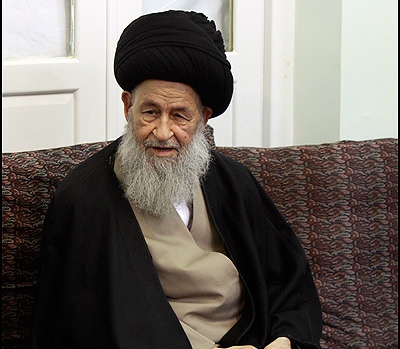AhlulBayt News Agency - Ayatollah Alavi-Gorgani told the president of the Assembly of the Representatives of the Islamic Seminaries that: “before the Revolution, the clergy were not active in political affairs and the seminaries and universities were skeptical of this issue but today, thanks to the late Imam, people have understood that society should be spiritual. "
Grand Ayatollah Sayyed Mohammad-Ali Alavi-Gorgani has met with Hujjat al-Islam Sayyed Ali Hoseyninejad, the president of the Assembly of the Representatives of the Islamic Seminaries, and stressed that before the 1979 Islamic Revolution, the path of the late Imam Khomeini was vital because during that time, when the enemies were striving hard to stop the Revolution, the Imam felt that the Islamic Seminary must change its path.
He added that the founder of the Islamic Revolution referred these affairs to the greatest source of emulation of the time, Grand Ayatollah Tabatabaei-Boroujerdi and did not act, but after his death in 1961 and while in exile in Najaf, Imam Khomeini saw that Iran was aflame and under severe oppression and it realized that this Revolution must ultimately proceed through his efforts.
His Eminence referred to the recent remarks of the Supreme Leader of the Islamic Revolution, Ayatollah Sayyed Ali Khamenei, who said that we must move forward on a revolutionary path.
“In this great community of today, if we are indifferent, inevitably, a path will be provided for others because it is possible that others dislike the revolutionary movement and want to deviate it from its original path,” he said.
Ayatollah Alavi-Gorgani pointed to the abundant fruits of the Islamic Revolution and said that the Revolution had many gifts and one of its foremost blessings was the establishment of a relationship between the people and government officials, scholars and clergy.
“Today, the country’s military officials, including the army, law enforcement and Revolutionary Guards have good relations with the sources of emulation but before the victory of the Islamic Revolution, such a relationship did not exist by any means,” the source of emulation said.
The revered scholar said that before the Revolution, the clergy were not active in political affairs and the seminaries and universities were skeptical of this issue but today, thanks to the late Imam, people have understood that society should be spiritual.
Thus, if we can protect the Revolution, our actions must be on this path so that the people are interested in the Revolution. If we do this, we will have fulfilled our duties but if we are indifferent and act in such a way that people turn away from us, our Revolution will be destroyed.
Ayatollah Alavi-Gorgani said that we must not allow the central axis of Iran’s Islamic system to be weakened because the weakening of the country’s Leader and the system of ‘Guardianship of the Jurisprudent’ will lead to the weakening of the clergy, the system and the country.
“Today, Ayatollah Khamenei holds the reins of power in the world, and not just in Iran. Thus, we must not allow this flag to touch the ground,” he stressed.
/257

